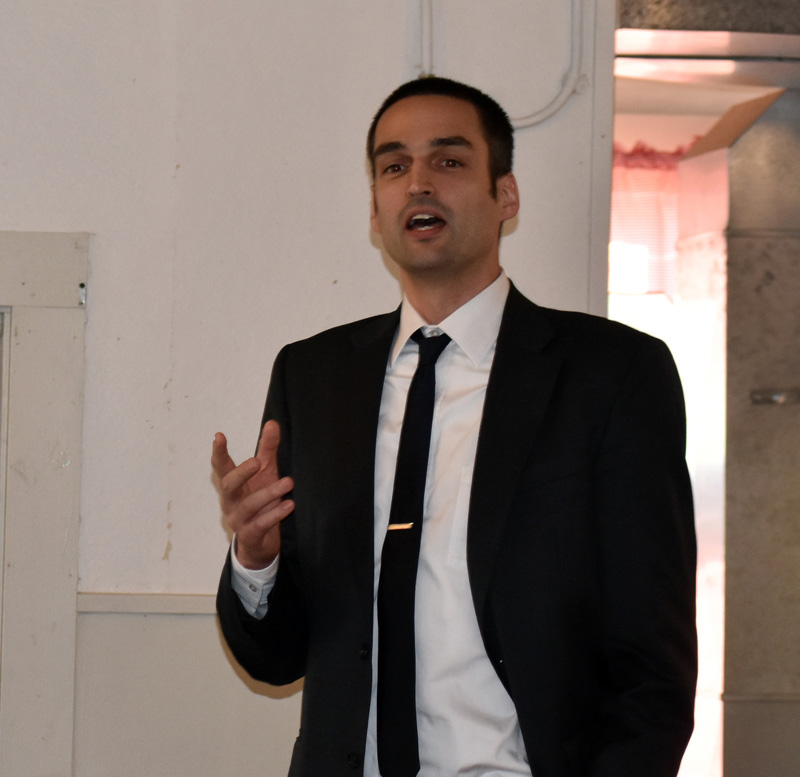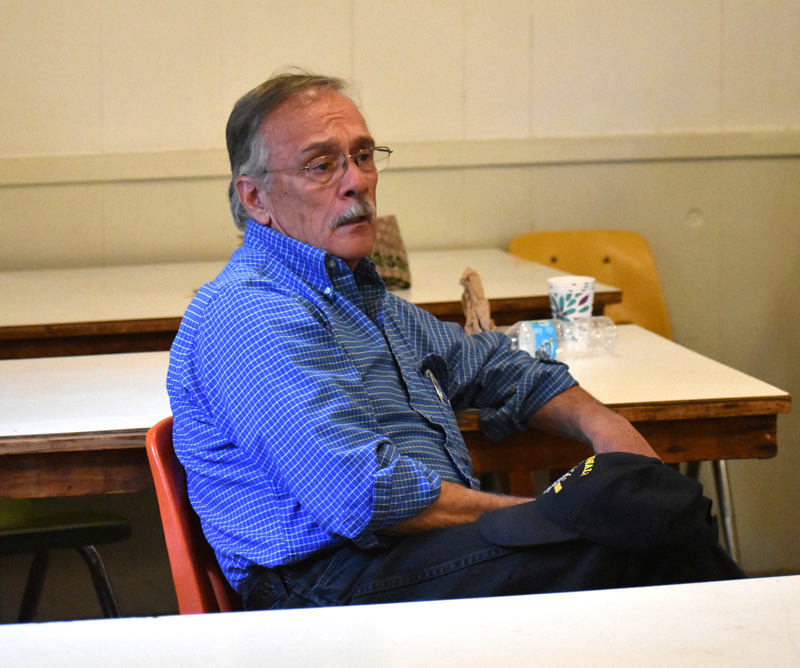
Alan Plummer and Chloe Maxmin, candidates for the Democratic primary in Maine House District 88, address the audience during a forum at the Kings Mills Union Hall on Thursday, May 24. (Alexander Violo photos)
The two candidates for the Democratic nomination in Maine House District 88 fielded questions about citizen’s initiatives, partisanship, and many other issues during a candidates forum at a full Kings Mills Union Hall on Thursday, May 24.
Chloe Maxmin, of Nobleboro, and Alan Plummer, of Chelsea, are the candidates in the county’s only contested legislative primary. Democratic voters will select a nominee Tuesday, June 12.
The Lincoln County News hosted the forum. Editor J.W. Oliver was the moderator. Oliver and the audience took turns asking questions of the candidates, and the candidates asked each other one question.
Maxmin, a graduate of Lincoln Academy who grew up in Nobleboro, started the Climate Action Club at LA before attending Harvard College in Cambridge, Mass., where she founded Divest Harvard, a campaign calling on the university to divest from fossil fuels.
Maxmin is a graduate of Emerge Maine, a six-month candidate training program for Democratic women, and has worked as community organizer.
Plummer, who describes himself as a Democrat with an independent lens, grew up in Whitefield and is currently a teacher at Stepping Stones Montessori School in Augusta. Plummer served four years in the U.S. Army and has 20 years of teaching experience.
The first question of the evening was from Dennis Merrill, of Whitefield, who asked the candidates for their opinions on the citizen’s initiative process.
Maxmin said she views the process as very important and thinks the Legislature should honor the results.
“It’s completely outrageous the Legislature … has refused to implement multiple referendum questions we voted on. It’s beyond outrageous,” Maxmin said.
Plummer said he is also in favor of the citizen’s initiative process, but feels that if state legislators represented their constituents more effectively, the process wouldn’t be needed.
“If the Legislature is doing the job they should, this side process wouldn’t need to happen, but doggone it, if it receives enough votes and passes, I think that should be it,” Plummer said.
The next question from the public related to a proposal by Central Maine Power Co. to build a 145-mile transmission line that would bring hydroelectric power from Hydro-Quebec to Massachusetts. The line would pass through the district.
Maxmin said she does not support the effort and said Hydro-Quebec has not released enough information to make an adequate assessment. She said the proposed path would bring the transmission line through important ecological areas of the Kennebec River.

J.W. Oliver, editor of The Lincoln County News, opens the candidates forum at the Kings Mills Union Hall in Whitefield on Thursday, May 24. (Alexander Violo photo)
Plummer said he does not support the proposal and does not see it as beneficial for the state.
“If it doesn’t benefit Maine, why should we do it? It’s our resource,” Plummer said.
Later in the evening the candidates turned to a discussion on climate change.
Maxmin said her goal is to transition the state to 100 percent renewable energy by 2050.
“I think we can be a real leader. We aren’t causing it, but we are impacted by it, and that is what leadership is,” Maxmin said.
Maxmin said the state’s economy is based on farming and fishing, and the warming of the economically vital Gulf of Maine is worth addressing.
“The very heart of our economy is at stake. It’s really important, as we think of the renewable energy economy, we think of all the jobs we can bring to Maine,” Maxmin said.
Maxmin discussed offshore wind and the importance of working with the communities where maritime wind farms would be located.
Plummer discussed his conversations with a fishermen’s union on green energy, specifically offshore wind.
“They do want it, but prime fishing grounds are pretty important too. There are lots of proposals smack-dab in the middle of good fisheries, taking up surface area they need. They know their livelihood is moving north, but they want a seat at the table,” Plummer said.
Responding to a question from the moderator regarding partisan gridlock, Plummer said he is willing to reach across the aisle and work with anyone.
“I care about funding for our schools. We are a long way from 55 percent and the towns are really feeling it. I voted against every article of the RSU 12 budget because the people of Chelsea can’t afford it. People need to work together and discuss the issues,” Plummer said.
Maxmin said she grew up in a Republican area and her politics didn’t matter to her neighbors.
“Democrats and Republicans sit on opposite sides of the aisle. It’s symbolically built to be partisan. There is more that unites us than divides us. Our constituents are all saying the same thing. They want health care or education and they want to be listened to,” Maxmin said.
The next question from the moderator dealt with the state’s ongoing opioid crisis.
The state had 418 fatal drug overdoses in 2017, according to Oliver.
Plummer said he has spoken with Lincoln County Sheriff Todd Brackett on the crisis and the sheriff believes people are falling through gaps in society.
“So many gaps need to be filled. I’m amazed people like me are dying from overdoses. I would work with the sheriff and work with mental health professionals to see what we can do to get people into programs,” Plummer said.
Maxmin said she believes the issue needs more attention.

Alan Russo, of Whitefield, asks a question about right-to-work laws during a candidates forum in Whitefield on Thursday, May 24. (Alexander Violo photo)
“There has almost been no increase in the number of treatment facilities in the state. It’s critically important we invest in treatment centers for mental health and access to Narcan,” Maxmin said.
The next question from the public dealt with tax exemptions for big corporations, such as General Dynamics, the parent company of Bath Iron Works.
Maxmin said she is opposed to tax breaks of this nature, indicating that the CEO of General Dynamics makes $21 million per year.
“(Gov. Paul) LePage, in mirroring Trump, is making sure the wealthiest and most powerful people receive tax cuts,” Maxmin said.
Plummer said he is a big supporter of small- and medium-sized businesses and would vote against the type of tax breaks companies, including General Dynamics, have come to expect.
“With the money they make here, they would probably continue even without the tax break. If we continue to give big breaks to companies with CEOs that make that kind of money, we are just giving it away,” Plummer said.
Responding to a question on the minimum wage, Maxmin said she is in favor of a living wage.
“I’m a very strong supporter of a minimum wage that is a living wage. Whatever it is should be enough to take care of you and your family. When people make more money, they are investing more in our economy. The minimum wage has to be a living wage,” Maxmin said.
Plummer said it is important to increase the minimum wage to keep people from moving out of state.
“We need to increase it. If we don’t, no one wants those jobs. You can’t do those jobs and survive,” Plummer said.
Plummer said tax breaks for the wealthy are not creating economic relief.
“Those incentives for the 1 percent are very frustrating for me. I don’t think they need it and don’t believe in trickle-down economics,” Plummer said.
The final question of the evening was from Alan Russo, of Whitefield, on right-to-work legislation.
Plummer said he supports unions and believes in their importance, citing his experience as a teacher.
“I’m a believer in unions. I think they make our economy stronger,” Plummer said.
Plummer said he didn’t think it would be fair to allow workers who do not pay union dues to reap the benefits of union representation.
Maxmin said she opposes right-to-work legislation.
“I’m against LePage’s assaults on unions … We need to support them wherever we can,” Maxmin said.



